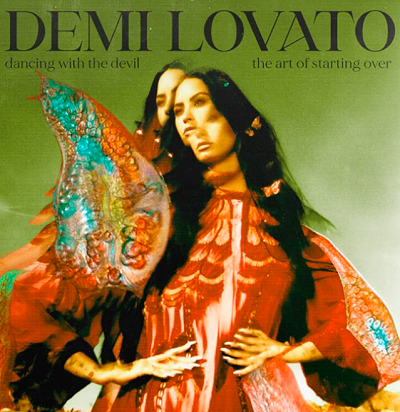Album Review: Demi Lovato – Dancing with the Devil… the Art of Starting Over
4 min read
There’s no question Demi Lovato has a spectacular voice. Even so, to some, she is just another pop star. However, there is a greater magnitude to her new album Dancing With The Devil…The Art of Starting Over than with most pop albums. It comes nearly 3 years after her near-fatal heroin overdose and has been released alongside the YouTube docuseries Dancing With The Devil, which showcases the traumatic experiences of her troubled life which led up to the fateful night in July 2018 and her subsequent recovery. The singer has been in the limelight since adolescence and this album feels like a culmination of the many damaging experiences and emotions such a young superstar is tragically and inevitably exposed to.
 The first note of the opening song Anyone sets a sombre tone for an artist struggling with such issues. The vocals are set against gentle piano and embodies a disenfranchised character expressing the saddening assumption ‘nobody’s listening to me anymore’, along with the pitiful emotion ‘I feel stupid when I sing’. The vocals explode during the chorus, which is brave given that the unenergetic piano remains the sole musical accompaniment throughout the song, shining a harsh light on the naked vocals, but this only makes more real the emotion of the song and Lovato holds up well. Despite the obvious resentment within the song – ‘why the f*** am I praying anyway’ – it is clear the character is desperate and crying out for help, an interpretation embodied and amplified by Lovato’s must-watch performance of the song at the 2020 Grammys.
The first note of the opening song Anyone sets a sombre tone for an artist struggling with such issues. The vocals are set against gentle piano and embodies a disenfranchised character expressing the saddening assumption ‘nobody’s listening to me anymore’, along with the pitiful emotion ‘I feel stupid when I sing’. The vocals explode during the chorus, which is brave given that the unenergetic piano remains the sole musical accompaniment throughout the song, shining a harsh light on the naked vocals, but this only makes more real the emotion of the song and Lovato holds up well. Despite the obvious resentment within the song – ‘why the f*** am I praying anyway’ – it is clear the character is desperate and crying out for help, an interpretation embodied and amplified by Lovato’s must-watch performance of the song at the 2020 Grammys.
The song Dancing With The Devil represents perfectly the side of this multi-layered album that deals with dark matters through pop. This representation is heard straight away, with an archetypal pop diva vocalisation leading into the ominous opening line ‘It’s just a little red wine, I’ll be fine’. It is an anthem of a song, following the classic verse-chorus-verse-chorus-bridge-chorus song structure, with a heavy electronic beat coming in at the second verse and a huge crash on every 1 beat of the chorus that further serves to depict the darkness of the song.
The high register piano of ICU (Madison’s Lullaby) offers a musical reprieve from the heaviness but digging deeper into the story behind the ballad about Lovato’s younger sister unearths even more upset as the inspiration of the song was borne from Demi waking up from her overdose legally blind, not knowing whom her sister was. Nonetheless, it is an affectionate song that uses clever wordplay, joining Demi’s experience in an Intensive Care Unit and being able to see her sister once more: ‘I was blind but now…ICU’.
Intro, a 25 second spoken word piece, serves as an early interlude, separating the previous songs that focused on the dark and depressive, and the songs that follow which, in Lovato’s words, ‘shed the skin of my past’. One would therefore expect the rest of the album to offer a positive perspective, and indeed The Art of Starting Over begins the next section of the album with a funky intro and sets up a positive outlook for the future and revels in the success of starting over and the empowerment of new beginnings.
However, the assumption of uncompromising positivity proves oversimplified at times, such as in Lonely People, a Taylor Swift-sounding song that portrays a rather cynical but realistic view of romance. Facing this reality though actually promotes a sense of empowerment, simplifying the complexities of one’s personal issues down to the summation that ‘we’re all lonely people’ and that you will ‘…die alone, so you better love yourself before you go’.
Hints of negativity creep into some of the other songs, but make no mistake, ‘Dancing With The Devil…The Art of Starting Over’ is most certainly a pop album, filled with anthems, ballads and collaborations, and even a cover of Tears For Fears’ Mad World. That said, it is an intensely introspective album that covers many aspects of Lovato’s experiences, emotions, and feelings. Watching the documentary enhances the listening experience of the album as it allows one to appreciate the context of many of the songs, as well as the acoustics.
It may cause concern to learn that Lovato’s recovery and state of mind has not been as clear-cut and clean as would be hoped, but this honesty is worthy of respect and paints a more realistic picture of the effects of many of society’s most crippling issues. In addition, the album does paint an overall positive image and so should appeal to pop fans drawn to light and positive topics, as well as those drawn to more dark and realistic ones.




